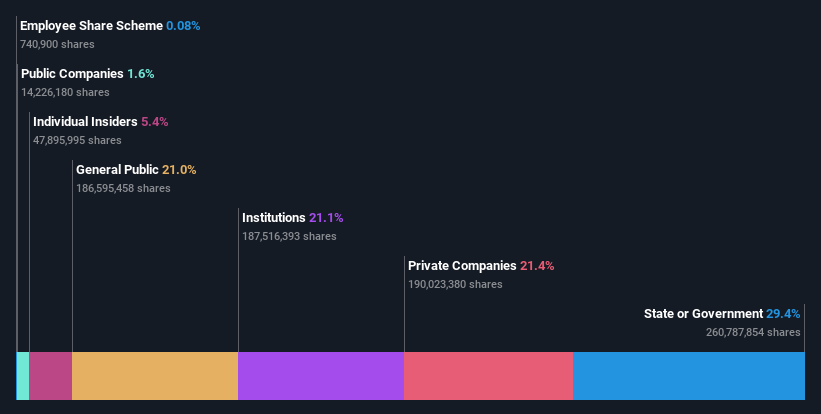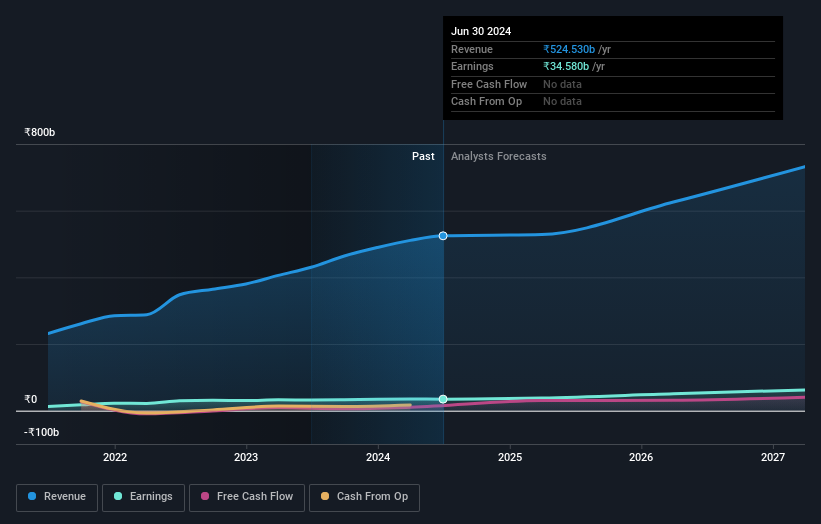Titan Company Limited's (NSE:TITAN) stock price dropped 3.4% last week; state or government would not be happy

Key Insights
- The considerable ownership by state or government in Titan indicates that they collectively have a greater say in management and business strategy
- 55% of the business is held by the top 3 shareholders
- Institutions own 21% of Titan
Every investor in Titan Company Limited (NSE:TITAN) should be aware of the most powerful shareholder groups. And the group that holds the biggest piece of the pie are state or government with 29% ownership. Put another way, the group faces the maximum upside potential (or downside risk).
As a result, state or government as a group endured the highest losses last week after market cap fell by ₹102b.
In the chart below, we zoom in on the different ownership groups of Titan.
View our latest analysis for Titan

What Does The Institutional Ownership Tell Us About Titan?
Institutional investors commonly compare their own returns to the returns of a commonly followed index. So they generally do consider buying larger companies that are included in the relevant benchmark index.
We can see that Titan does have institutional investors; and they hold a good portion of the company's stock. This implies the analysts working for those institutions have looked at the stock and they like it. But just like anyone else, they could be wrong. If multiple institutions change their view on a stock at the same time, you could see the share price drop fast. It's therefore worth looking at Titan's earnings history below. Of course, the future is what really matters.

Titan is not owned by hedge funds. The company's largest shareholder is Tamil Nadu Industrial Development Corporation Limited, with ownership of 28%. For context, the second largest shareholder holds about 21% of the shares outstanding, followed by an ownership of 5.4% by the third-largest shareholder.
To make our study more interesting, we found that the top 3 shareholders have a majority ownership in the company, meaning that they are powerful enough to influence the decisions of the company.
While studying institutional ownership for a company can add value to your research, it is also a good practice to research analyst recommendations to get a deeper understand of a stock's expected performance. There are a reasonable number of analysts covering the stock, so it might be useful to find out their aggregate view on the future.
Insider Ownership Of Titan
While the precise definition of an insider can be subjective, almost everyone considers board members to be insiders. Management ultimately answers to the board. However, it is not uncommon for managers to be executive board members, especially if they are a founder or the CEO.
Most consider insider ownership a positive because it can indicate the board is well aligned with other shareholders. However, on some occasions too much power is concentrated within this group.
Shareholders would probably be interested to learn that insiders own shares in Titan Company Limited. It is a very large company, and board members collectively own ₹156b worth of shares (at current prices). we sometimes take an interest in whether they have been buying or selling.
General Public Ownership
The general public-- including retail investors -- own 21% stake in the company, and hence can't easily be ignored. While this size of ownership may not be enough to sway a policy decision in their favour, they can still make a collective impact on company policies.
Private Company Ownership
We can see that Private Companies own 21%, of the shares on issue. It might be worth looking deeper into this. If related parties, such as insiders, have an interest in one of these private companies, that should be disclosed in the annual report. Private companies may also have a strategic interest in the company.
Next Steps:
I find it very interesting to look at who exactly owns a company. But to truly gain insight, we need to consider other information, too. For instance, we've identified 2 warning signs for Titan (1 is a bit unpleasant) that you should be aware of.
Ultimately the future is most important. You can access this free report on analyst forecasts for the company.
NB: Figures in this article are calculated using data from the last twelve months, which refer to the 12-month period ending on the last date of the month the financial statement is dated. This may not be consistent with full year annual report figures.
Valuation is complex, but we're here to simplify it.
Discover if Titan might be undervalued or overvalued with our detailed analysis, featuring fair value estimates, potential risks, dividends, insider trades, and its financial condition.
Access Free AnalysisHave feedback on this article? Concerned about the content? Get in touch with us directly. Alternatively, email editorial-team (at) simplywallst.com.
This article by Simply Wall St is general in nature. We provide commentary based on historical data and analyst forecasts only using an unbiased methodology and our articles are not intended to be financial advice. It does not constitute a recommendation to buy or sell any stock, and does not take account of your objectives, or your financial situation. We aim to bring you long-term focused analysis driven by fundamental data. Note that our analysis may not factor in the latest price-sensitive company announcements or qualitative material. Simply Wall St has no position in any stocks mentioned.
About NSEI:TITAN
Titan
Manufactures and sells watches, jewelry, eyewear, and other accessories and products in India and internationally.
High growth potential average dividend payer.
Similar Companies
Market Insights
Community Narratives




